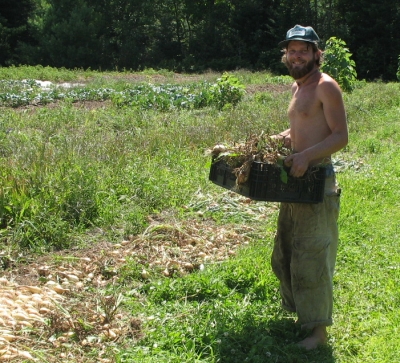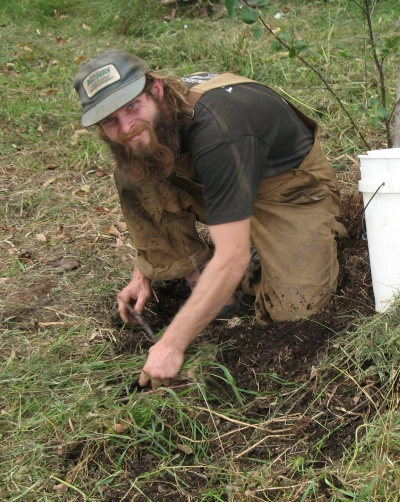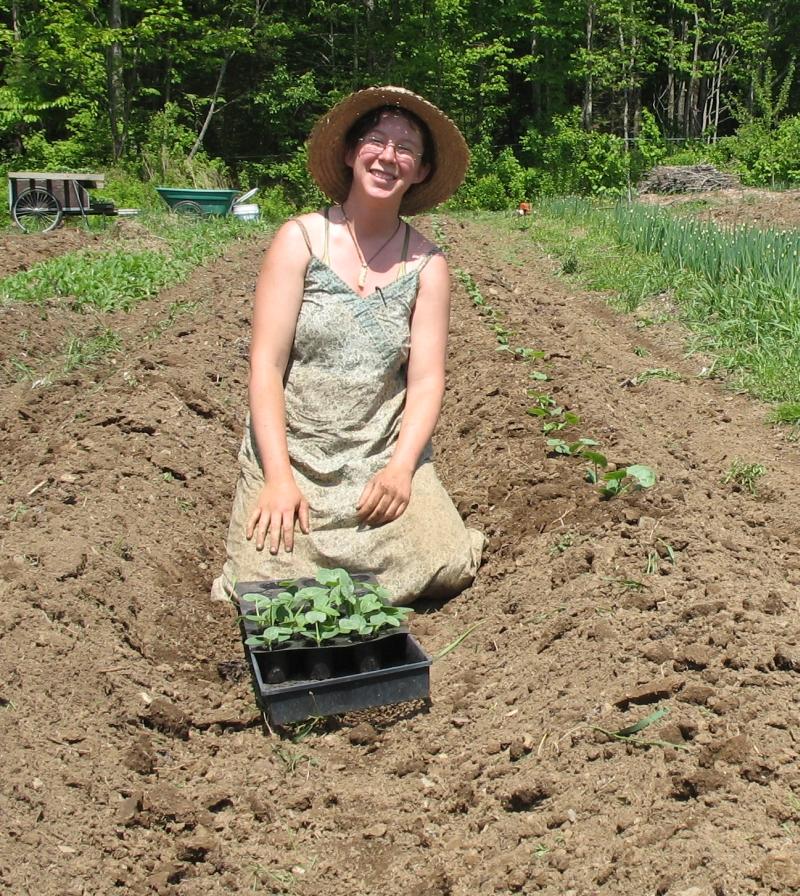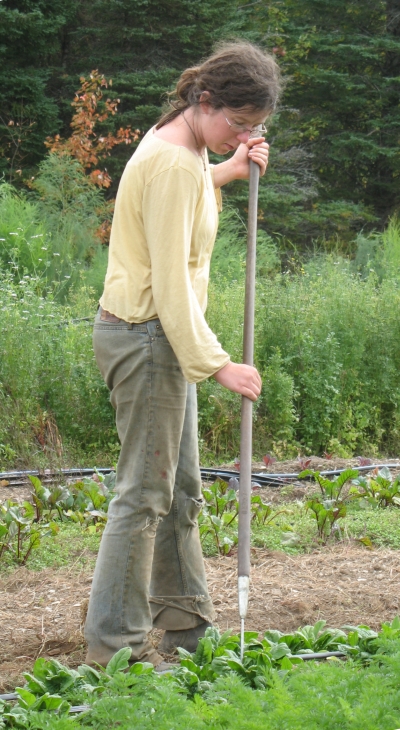
Our Apprentices (2006-2009)
For years we have wanted to host real apprentices, not just annual summer interns, but folks who were serious about living the farming life. We believe it is critical for apprentices to be immersed in farming by experiencing the entire annual ebb and flow of farm work and plant growth, including crop and soil management. In order for us to teach them to become farmers themselves, we must show them the whole gamut of our farm, from the leisurely winter months to the intensity of high summer, from the preparations of spring to the cleanup in autumn. We have been looking for apprentices in the old style, when young people would leave home to apprentice with a guild member to learn a trade. We think we may have found them.
Look for our apprentices at the farmers’ markets during the summer and say “Hi!”. Here are their stories in their own words, after a brief introduction to each by yours truly.
Postscript. During the summer of 2009, Jack and Coco became increasingly dissatisfied with almost everything that was going on at the farm. We had given them more autonomy than in previous years, and it is possible that they weren’t ready for the increased responsibilities. At any rate they left at the end of August, and we haven’t heard from them since. Several of our hourly workers stepped in to pick up the slack, so we were able to finish out the year on an even keel. We still miss them, and we are not averse to trying the same plan again with new apprentices. See our Working Here page for more info.
 Jack Cozart joined us in January, 2006, as an apprentice, after working here the previous fall. He came to help out a friend work here planting garlic, and after a morning’s planting and mulching, was invited to return for regular employment. Nearly always barefoot, in the photo he is picking up the last of the September onions.
Jack Cozart joined us in January, 2006, as an apprentice, after working here the previous fall. He came to help out a friend work here planting garlic, and after a morning’s planting and mulching, was invited to return for regular employment. Nearly always barefoot, in the photo he is picking up the last of the September onions.
“I was brought to Snakeroot by Mitch Miller, a mutual friend of Tom, Lois, and me. After spending the afternoon planting garlic I was offered a job. Coming day after day and week after week I grew to understand that the physical labor, the good times, and the education I was receiving without even knowing it was really what I was looking for in my life. This place gave me the opportunity to engulf myself in a lifestyle that I was already half living while I was getting my education at Unity College in Environmental Studies.
 “Tom and Lois gave me the opportunity to settle down and use all of the skills I have been developing over the years, and not have to do all the traveling that I was getting weary of. Now after being here for two seasons I know that I would like to keep the farm up and running and be able to do what I enjoy: that is being in touch with nature and doing my part to keep the earth the way it should be in its natural state; that is living communally with mother nature and having the opportunity to educate the public about how the way they shop and purchase goods effects everything. “
“Tom and Lois gave me the opportunity to settle down and use all of the skills I have been developing over the years, and not have to do all the traveling that I was getting weary of. Now after being here for two seasons I know that I would like to keep the farm up and running and be able to do what I enjoy: that is being in touch with nature and doing my part to keep the earth the way it should be in its natural state; that is living communally with mother nature and having the opportunity to educate the public about how the way they shop and purchase goods effects everything. “
 Coco Page joined us in the fall of 2006, after meeting Jack at the Waterville Farmers’ Market, where she was apprenticing a farm in Athens. She arrived here just in time to get one last picking from the green beans before frost totally killed the plants.
Coco Page joined us in the fall of 2006, after meeting Jack at the Waterville Farmers’ Market, where she was apprenticing a farm in Athens. She arrived here just in time to get one last picking from the green beans before frost totally killed the plants.
“I am farming because I had no idea what I wanted to do when I finished school. I graduated with a B.A. in Art and many semesters toying with Education and Environmental Studies. I knew what I didn’t want: a job in an office, the need to buy fancier clothes to wear to work, or a small apartment and a long commute. I didn’t want to leave Maine, and I didn’t want to live in a city. Before graduating I met Bob and Arleen Lovelace, who invited me to live and work with them on their small farm for the summer. Since I was immediately in love with them, their home, their attitude, and their lifestyle, I decided it would be a nice way to live while I figured out what I would do next. At first it was just a fun and beautiful job, but the more time I worked and saw the results of my labor the more I was convinced that growing vegetables was something I could do happily into the future.
“Working on a small organic farm has many benefits—nice colors, smells, sounds, and tastes, exercise; it is a healthy way to live. We are preserving wilderness and open space, maintaining a safe and nutritious community food source, and living in a low-impact manner which creates a lot from few inputs. I like that we can ignore the convenience that chemical agro-science has provided and depend instead on natural life cycles and an awareness and understanding of how things interact.
 “I came to Snakeroot to hang out with the cute apprentice, and simply never left. Now I learn from and work with a family of like-minded people, and I could not ask for more. The work we do creates fresh food while caring for the land that allows us our lifestyle. The way we have chosen to live demands a lot of hard work; the return is independence, creative freedom, and a sense of satisfaction at the end of every day.”
“I came to Snakeroot to hang out with the cute apprentice, and simply never left. Now I learn from and work with a family of like-minded people, and I could not ask for more. The work we do creates fresh food while caring for the land that allows us our lifestyle. The way we have chosen to live demands a lot of hard work; the return is independence, creative freedom, and a sense of satisfaction at the end of every day.”
